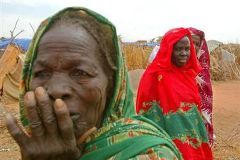African mediators in final push over Darfur security deal
By Silvia Aloisi
ABUJA, Nov 1 (Reuters) – Mediators urged the Sudanese government and two Darfur rebel movements on Monday to sign a security agreement they hope will end violence that has driven more than 1.5 million people from their homes.

|
|
Displaced women stand in the Zam Zam refugee camp. |
Government and rebel negotiators holding peace talks in Nigeria’s capital Abuja were given late on Monday a final draft of the African Union-sponsored accord. Both sides said they needed time to study the proposals but initial reactions were cautiously warmer than after previous drafts.
“There is a very remarkable improvement on the document,” said State Minister for Foreign Affairs Najeeb al-Kheir Abdul Wahab.
A spokesman for the main rebel movement, the Sudan Liberation Army, said the latest draft was “better” than earlier versions.
The security proposal requires the government to make good on pledges to disarm Arab Janjaweed militia and identify any militia groups they have been supporting.
It calls for an end to “hostile military flights” over Darfur — a concession to the rebels who say government planes are still bombing villages in the region.
The document also calls on both sides to cooperate with the AU cease-fire commission and say where their forces are located — something the rebels have so far been reluctant to accept.
“We are telling them: this is not perfect, but it’s the best compromise we can offer,” said a European diplomat at the talks.
The United Nations says Darfur is one of the world’s worst humanitarian crises, which has killed around 70,000 people through disease and malnutrition since March. There are no reliable figures for how many people have died in the fighting.
The peace talks, which started a week ago, have so far stalled on the security accord — which is holding up the signing of an already-agreed humanitarian protocol and triggered the collapse of a previous round of negotiations in Abuja.
“We are under enormous pressure to sign. But we have to balance that pressure with what we think is needed on the ground to protect our people,” said Ahmed Hussain of the Justice and Equality Movement, the smaller of the two rebel groups.
“We don’t want to lose the support of the international community, which for us is vital, but we don’t want to lose our people either,” he said.
The African Union is expanding its force in Darfur to more than 3,300. The mission’s main task is to monitor a cease-fire agreed in April that each side accuses the other of breaking, but their mandate also includes protecting civilians threatened with immediate harm.
The Darfur rebellion began in February 2003 after years of low-level fighting between mainly African farmers and Arab nomads over scarce resources.
The rebels accuse Khartoum of using the mounted Janjaweed to loot and burn non-Arab villages. On Monday, the SLA said Janjaweed had attacked a bus near western Darfur town of Nertiti and killed 30 passengers.
Khartoum denies any links to the Janjaweed, arguing over the exact definition of the militia it says is one of many armed groups separate from paramilitary groups recognized by the government.
